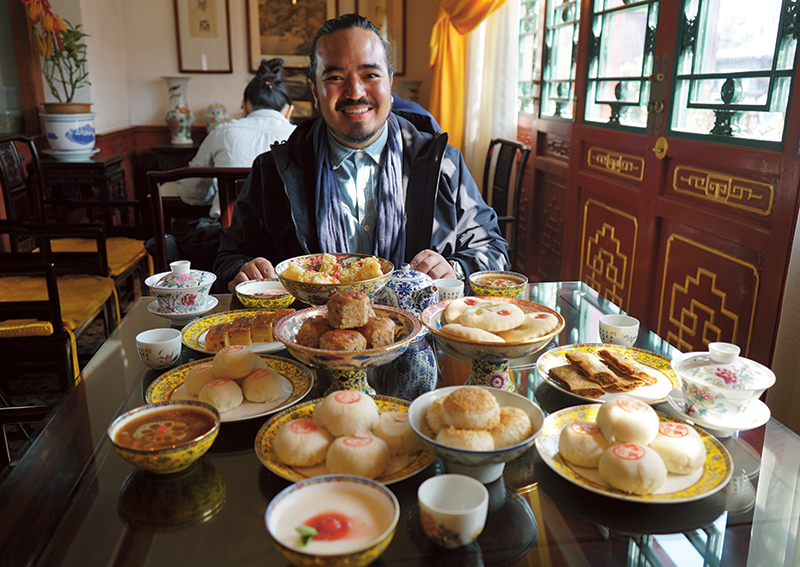
Adam Liaw has travelled around Australia, Japan and Scandinavia for previous seasons of Destination Flavour, but the show’s sixth season sees him embarking on his greatest challenge yet: covering the breadth of Chinese cuisine. There is just one problem, he explains with that seemingly ever-present smile: “there’s no such thing as Chinese food”.
“Every region has a cuisine with a very, very different taste,” he says, before rattling off a list of names that would challenge even the most savvy diner. “I thought I knew a fair bit about Chinese food before I went but the regionality of it was just mindblowing; on the north side of Shanghai you have Jiangsu province and on the south side you have Zhejiang and the difference between those two cuisines is just phenomenal.”
Further afield, the Yunnan region borders Laos and Myanmar as well as the Himalayan foothills, “so the cuisine there is very Southeast Asian and slightly subcontinental”. Szechuan cuisine is famously peppery, but related Hunan cuisine is “a spicier cuisine that’s also salty. And that’s not even the half of it!”.
Pressed for a favourite, he nominates Shandong cuisine, which is “probably the most famous within China” and can claim iconic dishes and techniques like Peking duck and stir frying. Clearly, there’s a lot of ground to cover geographically and Liaw also expands the scope of the series beyond the vernacular food that he usually focusses on.
In the past, he’s tried to stay away from delicacies because “they don’t really tell the story of what regular people eat”. But the narratives of food, society and cultural history are so interconnected over millennia in China that he finds those barriers broke down.
He offers the example of Jiangsu, which is crossed by the Grand Canal. The world’s oldest and longest canal first brought the salt trade through the province more than 2000 years ago, and the cuisine naturally began to reflect the condiment’s ready availability. Over time, the wealthier merchants in the region began to favour sweet delicacies that contrasted with the salty peasant food and today the sweeter, refined cuisine reflects this history.

Liaw also finds that the role played by chefs in China is markedly different to those roles in Australia. “In the newer world, refined dining tends to be about creativity – it can tell you a lot about the chef but not necessarily about the people,” he says, which is why he hasn’t paid a lot of attention to it in previous seasons. “But China has such an interesting history that the refined cuisine tells a lot of stories about that history.”
Rather than putting their own individual stamp on dishes, many of the chefs he encounters try to distil the wisdom of millennia-old traditions. One restaurateur he encountered sought out retired chefs from some of the most famous Zhejiang restaurants and asksthem to work in his kitchen as mentors – they don’t even need to cook if they don’t want to. As a result, Dragon Well Manor is one of the most famous restaurants in Hangzhou, and Liaw laughs that he’s only exaggerating slightly to say that “you go into the kitchen and half of the chefs are 85 years old and the other half are 15 years old so there’s this amazing exchange of knowledge”
One of the hallmarks of Dragon Well Manor is the proprietor’s relationships with local producers, and he keeps a ledger that records every produce delivery he’s had for decades and who it came from. Naturally, Liaw also wants to connect with some producers while he is in China and this takes him well beyond the megacities that encompass populations greater than all of Australia combined.
One memorable highlight was meeting a tofu maker who gets up at 3am every day to begin work. Though his store doesn’t open until eight in the morning, by 6:30am he already has a line of customers outside his door, all eager to get the freshest produce possible. “In Australia we’re happy to buy tofu that’s been vacuum-packed and is who knows how old, but when you know what you’re doing you want to get the best of the best,” says Liaw.
It’s a far cry from the weekly shopping trips to Chinatown and the Central Market that Liaw grew up with, and he says that the Chinese food here is “almost unrecognisable” from what he encounters in the show. For starters, due to the large number of migrants from the south of China in the 19th and 20th centuries, “our idea of Chinese food is very strongly tied to Cantonese food which is very different from the rest of China”. But while Hong Kong and Guangzhou restaurants are full of forward-thinking, modern dishes, our Chinese restaurants have evolved far more slowly and reflect the cuisine of the 70s, or even earlier. Clearly when it comes to Chinese food, we still have a lot to learn.
Adam Liaw’s Destination Flavour China premieres on SBS on Wednesday, November 28